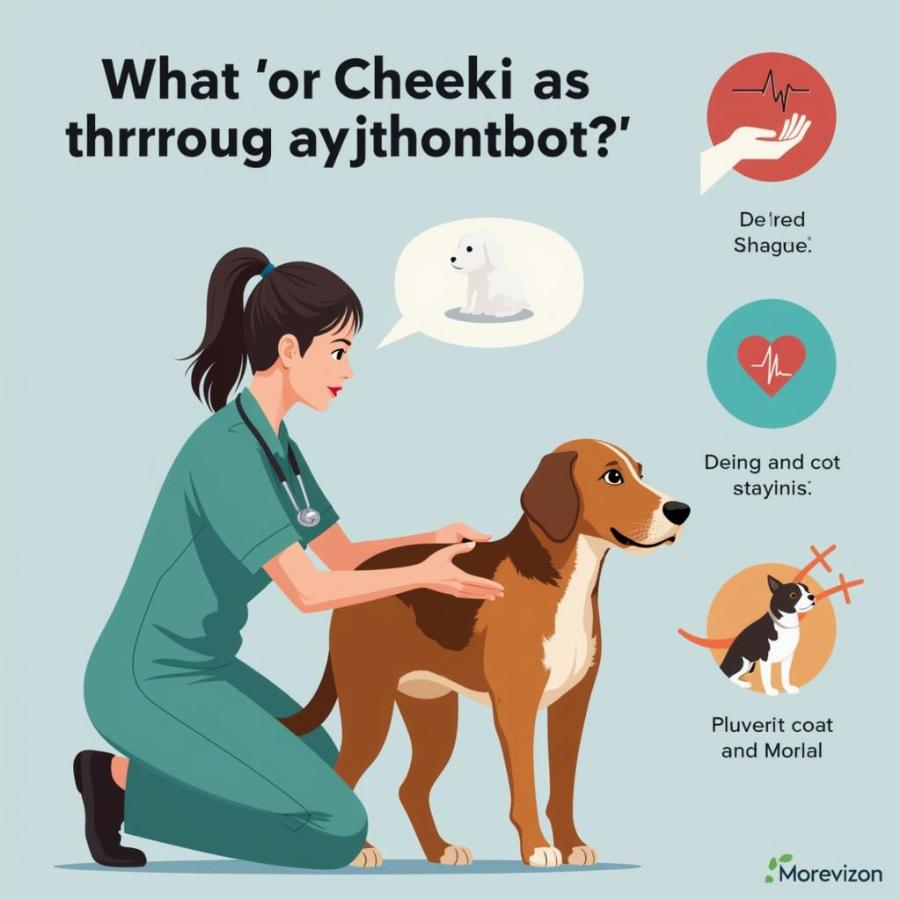Hypothyroidism in dogs can present various challenges, including weight gain, lethargy, and skin issues. Choosing the best dry dog food for hypothyroidism can significantly impact your furry friend’s health and well-being. A carefully selected diet can help manage these symptoms and support your dog’s overall thyroid function. This article delves into the crucial role of nutrition in managing canine hypothyroidism and guides you through selecting the ideal dry dog food to help your dog thrive.
Understanding the Dietary Needs of a Hypothyroid Dog
Dogs with hypothyroidism require a diet that supports their metabolism and addresses potential weight gain. This means choosing a dry dog food that’s rich in high-quality protein, moderate in healthy fats, and includes easily digestible carbohydrates. Fiber is also essential for maintaining a healthy digestive system and managing weight.
Key Ingredients to Look for in Dry Dog Food for Hypothyroidism
When selecting dry dog food for a hypothyroid dog, prioritize these key ingredients:
- High-quality animal protein: Chicken, turkey, lamb, and fish are excellent sources of protein that are easy to digest and support muscle maintenance.
- Healthy fats: Sources like fish oil and flaxseed provide essential fatty acids that contribute to healthy skin and coat, often compromised in hypothyroid dogs.
- Fiber-rich ingredients: Beet pulp, brown rice, and sweet potatoes help regulate digestion and manage weight.
- Limited fillers and artificial ingredients: Avoid foods with excessive corn, wheat, and soy, as these can hinder nutrient absorption.
What to Avoid in Dry Dog Food for Hypothyroidism
Certain ingredients can exacerbate hypothyroidism symptoms or interfere with medication absorption. Avoid dry dog foods containing:
- Soy: Soy can interfere with thyroid hormone absorption.
- Goitrogens: These substances, found in foods like broccoli and cabbage, can interfere with thyroid function. However, in commercially prepared dog food, these are typically in minimal amounts and not a significant concern.
- Artificial colors, flavors, and preservatives: These additives can trigger sensitivities in some dogs.
Choosing the Right Dry Dog Food: Reading Labels and Comparing Brands
Navigating pet food labels can be overwhelming. Focus on the guaranteed analysis, ingredient list, and AAFCO statement to ensure the food meets your dog’s needs.
Compare different brands and consider consulting your veterinarian for personalized recommendations.
How to Transition Your Dog to a New Dry Food
Switching your dog’s food abruptly can cause digestive upset. Gradually introduce the new food over 7-10 days, mixing increasing amounts with the old food until the transition is complete.
Monitoring Your Dog’s Progress
Once your dog is on the new diet, monitor their weight, energy levels, and skin and coat condition. Regular checkups with your veterinarian are crucial to track thyroid hormone levels and adjust medication as needed.
 Monitoring Dog's Health
Monitoring Dog's Health
Is Homemade Food an Option for Hypothyroid Dogs?
While homemade diets can be an option, it’s crucial to consult a veterinary nutritionist to ensure the diet is balanced and provides all necessary nutrients for a hypothyroid dog.
Conclusion
Choosing the best dry dog food for hypothyroidism is a vital step in managing your dog’s condition. By prioritizing high-quality ingredients, avoiding problematic substances, and working closely with your veterinarian, you can help your furry friend live a happy, healthy, and energetic life. Remember, a proper diet plays a crucial role in supporting your dog’s overall health and managing the challenges of hypothyroidism.
FAQ
- Can diet alone cure hypothyroidism in dogs? No, diet cannot cure hypothyroidism, but it plays a crucial role in managing symptoms and supporting overall health. Medication is typically required.
- How often should I feed my hypothyroid dog? Follow your veterinarian’s recommendations, but most adult dogs do well with two meals per day.
- What are signs my dog’s hypothyroidism is not well-managed? Lethargy, weight gain, hair loss, and skin infections can indicate the need for medication adjustments or dietary changes.
- Are there specific dog food brands recommended for hypothyroidism? Your veterinarian can offer personalized recommendations based on your dog’s individual needs.
- Can I give my hypothyroid dog supplements? Consult your veterinarian before giving any supplements, as some can interact with thyroid medication.